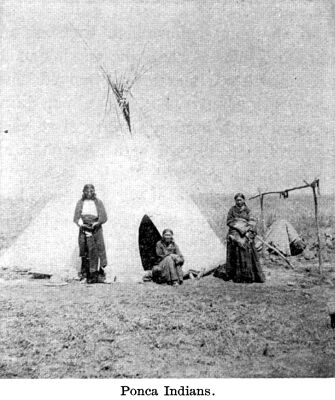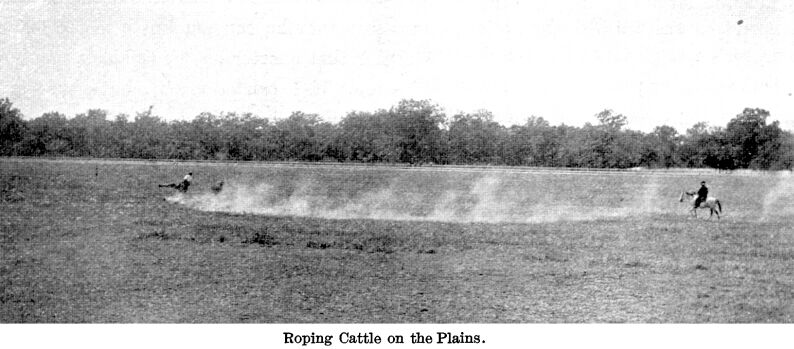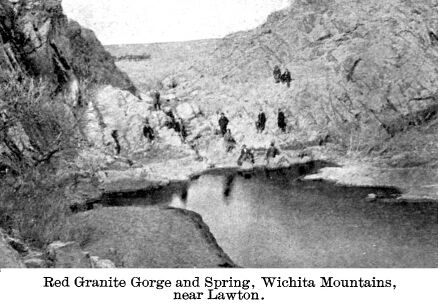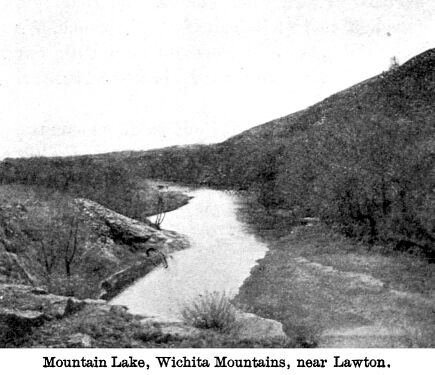|
WHY NO. 272 DID NOT FILE.
A story of the Great Land Lottery in Oklahoma.
BY A. R. C.
The incidents of the opening of the great Kiowa, Comanche,
Apache and Wichita-Caddo Indian reservations in Oklahoma, to white
settlement in the summer of 1901, are still comparatively fresh
in the public mind. The prospective settlers registered at the
El Reno and Lawton land offices, after which each name was written
on a card, and enclosed in an envelope. These envelopes were placed
in two large wheels, each supported on an axis with bearings and
cranks by which they were turned until the envelopes were thoroughly
mixed and shuffled. and they were then drawn out one at a time,
and the person whose name was contained was permitted to make
a Homestead Filing at the United States land office in his turn.
 Although 163,000
people registered, there were but 13,000 quarter sections of land
to dispose of, so that the interest in the drawing was intense.
Thousands who came to register in wagons remained in camp until
after the drawing, and then, most of them disappointed, took up
their toilsome journey s whither they knew not, for many had no
homes to which they might return. Although 163,000
people registered, there were but 13,000 quarter sections of land
to dispose of, so that the interest in the drawing was intense.
Thousands who came to register in wagons remained in camp until
after the drawing, and then, most of them disappointed, took up
their toilsome journey s whither they knew not, for many had no
homes to which they might return.
It was a few days after the beginning of this drawing that
an immigrant wagon, or "prairie schooner," might have
been seen passing eastward along the dusty highway, which leads
down the beautiful valley of the North Canadian river from El
Reno. The wagon was old and very much the worse for wear. Its
running gear creaked and rattled under the load which its rickety
box: loosely over the bows, to ward off the almost vertical rays
of the sun, and looped up at the sides, to permit the circulation
of the air, was worn and torn and covered with dust. The team,
an ill-fed, ill-groomed, ill-matched pair of jaded beasts, pulled
but slowly at best under the constant urging and prodding of the
driver. Beneath the rear axle-tree, with lolling tongue and limping
gait, paced "one yellow cur of low degree," and another
mongrel canine of the same general type trotted complacently along,
close by the heels of the near horse. Faces of children were visible,
peering from beneath the folds of the wagon sheets, faces none
too clean, sun-tanned and surmounted by shocks of unkempt yellow
hair. Finally the wagon came to a halt in front of a modest-looking
farm house which stood at the edge of a grove a few rods back
from the road. Then a woman was seen to climb out of the wagon
and approach the farm house, while a man, with loose-jointed,
slouchy figure, lazily dismounted, looked at the sun, took a generous
"chaw" from a large plug of tobacco, and then slowly
proceeded to make some needed repairs on the dilapidated harness
of the off horse, using the ever-present and always useful "balin-wire"
in the operation.
It was noontime in the farm house. The farmer's family was
gathered about the table for the midday meal, when a faint rap
was heard at the front door. The farmer himself answered the summons
to the door, where he found the woman who had come from the wagon.
Her sunbonnet was thrown back on her shoulders, disclosing a sallow,
care-worn face, and her tall, spare form was clad in a faded blue
calico gown. When the farmer said, "Come in," she remained
standing where she was, and timidly asked that she might see the
lady of the house. The farmer called his wife, who again invited
the stranger to enter the house.
"No'm, I'll not go in," she said. "We're movers
an' we're in a heap o' trouble. Ma's sick, an' she's old, an'
we must find a place to stop. Can you help us?"
The look of keen distress upon the otherwise expressionless
face appealed to the kindly heart of the farmer's wife, who said:
"Our house is full, but we can fix a place for your mother
in the old 'claim house.' It will be more quiet there, anyway."
And so it was that the old "raw-hide" shanty (i.e.,
made of rough native lumber), which had sheltered the farmer's
family for several years after Old Oklahoma was first opened to
settlement, was emptied and swept and dusted and prepared for
occupancy. Willing hands soon helped to carry the aged suferer
to the snowy bed, close by the little east window where a wild
grape vine almost screened out the light. The lines of her thin,
wan, stern-featured face relaxed when she looked up into that
of the farmer's wife and said:
"You're powerful kind, ma'am. I'm so tired—so tired
o' movin' I jes want to rest." Then she went to sleep.
The physician who was walled came, and, after asking a few
questions and examining the patient, shook his head.
"Worn out," was all that he would say.
Finding that her daughter was somewhat talkative and noting
an allusion to the Kiowa-Comanehe country, he asked if they had
been in that region.
"Yes, we drove purty much all over it after my man registered
at El Reno, an' before the drawin' come off."
"How did you like the country down there from what you
saw of it?" asked the doctor.
"Didn't like it at all—wouldn't live in it for all
of it," said she. "I haint got no use for any country
where pawpaws an' see' fraze can't strike. But then, ma, she did
want us to have a home o' our own, and for her sake, I believe
I could have lived there, 'cause she didn't want us to move no
more."
"Had your mother ever moved before?" asked the doctor.
"Lor', yes, I reckon ma never did live long enough in
one place so's that she could 'low that she was at home. She was
born in a wagon while her folks was movin' through from Indianny
to Pike county, Missoury, where they 'lowed to settle. That's
mighty nigh on to 75 years ago. They didn't stay settled there
all the time, though, for they did a sight of shiftin' 'round
while she was a child, the longest move bein' to Texas and back
agin. Then, when she was about 16 years old she was married an'
moved down to the Ozark country, but she an' pap didn't stay there
much more'n a year. Two years afterwards pap 'nlisted with Doniphan
an' went off to the war with Mexico, leavin' her to care for two
little ones. He come back jes' as the Californy gold fever swept
across the country, an' they started an' drove clear through to
the coast. But pap didn't find no gold, so they was movin' back
in less'n two years.
"While they was crossin' the Nevada desert the baby, Jimmie,
who was born in Californy, died an' was buried 'way out on an
alkali flat—the lonesomest place in all the world, ma used
to say. But poor ma couldn't spend much time mournin' for the
dead, when the livin' had to be cared for.

"When Kansas was opened to settlers in '54 they moved
out there, an' pap got a fine claim on the Wakarusy, but he soon
got tired an' moved back to the of stampin' ground in Pike county
agin. Then, in '59, when the Pike's Peak gold craze was on, they
moved to Colorado, acrost them dreary plains agin. But they wasn't
nothin' fer pap in the Californy Gulch diggin's, either, so they
took up the trail fer ol' Missoury once more. Then the war broke
out and the folks had to move several times, whether they wanted
to or not, for it was neighbor agin neighbor, an' brother agin
brother. But, law sakes, movin' was the least of ma's troubles
in them days, for her oldest boy, Bud, 'misted in the Yankee army
an' fell shot through the heart in the charge under Lyon at Wilson's
Creek. Then, a couple o' years later next boy, Andy, who'd been
one of Joe Shelby's most darin' riders, come back to his ma with
one sleeve of his grey jacket hangin' empty, an' he only lived
a few months after that.
 "A couple
o' years after the war pap was fer goin' to Montany an' startin'
a cattle ranch. We'd been out there nigh on to three years an'
it did seem as if maybe we was settled at last, when one day the
Blackfeet made a raid and cleaned out the ranch. We jes' did escape
to Fort Belknap with our lives. Then we moved back to Missouri
agin. "A couple
o' years after the war pap was fer goin' to Montany an' startin'
a cattle ranch. We'd been out there nigh on to three years an'
it did seem as if maybe we was settled at last, when one day the
Blackfeet made a raid and cleaned out the ranch. We jes' did escape
to Fort Belknap with our lives. Then we moved back to Missouri
agin.
"In '73 we moved out to Reno county, Kansas, where pap
taken a homestead. But the very next year the grasshoppers lit
down an' et up everything, so we took the shortest road leadin'
to of Pike county once more. In '76 we moved to the Black Hills,
but we didn't stay there many months. We stayed in Missoury then
until along in the summer of '80, when pap met up with one of
Dave Payne's boomers, who told him all about the wonders and beauties
of the Oklahoma country, an' after that nothin' would do but move,
an' move he must, an' move he did. Jes after the soldiers had
took the boomers back to the Kansas line, pap took down with the
'neumony an' died at Arkansas City. Ma didn't do much movin' after
that till '89, when we came back to Oklahoma with her youngest
son, Bent. Bent, he had a fine claim on the Cimmarron bottoms,
but there was a contest on it, an' one day he went to Guthrie
to the land office to see about it, an' that night he didn't come
home, an' the next day his dead body was found lyin' by the road,
where he'd been shot by some one hid in the brush. Then ma came
back to Missouri to us, an' she says to me, 'Molly,' says she,
`you're all I've got left, an' I don't want to move no more.
"But my man, he's always been a renter, an' we've generally
moved every two or three years. Last spring he heard tell of the
wonderful Kiowa country, an' he 'lowed as how that was our chance,
an', as we couldn't move off an' leave ma, she got ready to make
one more move. She didn't complain, only to say that she was tired,
an' that she did hope we'd get a home, an' not have to move no
more.
"Yes, ma's shore done right smart of movin' in her time,
but if what you 'low is true, she is mighty nigh through movin'
now. She didn't seem to have no heart nor sperrit after she found
that my man didn't draw no claim at El Reno—no she didn't
even seem to care to live till we could get back to Missoury agin."
When the farmer's wife came in, just as the narrative was finished,
she noticed that the doctor's eyes glistened and that he cleared
his throat as he passed out. In fact, he left without saying a
word, and others noticed that he was very much pre-occupied during
the rest of the day. He came back the next day and was there when
the spirit of his aged patient took its flight to the realms of
eternal rest, and he was there again when the worn-out body was
borne to the hillside burying ground, a mile away. There two sweet-voiced
girls sang:
"Oh, think of the home over there,"
 after which
the clergyman spoke briefly from the text, "In my Father's
house are many mansions," and then read the burial service
which proclaimed that the wanderings of one life were over and
that one longing soul had found its home. The members of the bereaved
family were profuse in their expressions of gratitude to the doctor—gratitude
was about all they had to give—but he seemed not to hear
them. As hell drove slowly homeward that warm afternoon, he not
only mused but fell to talking to himself as well. after which
the clergyman spoke briefly from the text, "In my Father's
house are many mansions," and then read the burial service
which proclaimed that the wanderings of one life were over and
that one longing soul had found its home. The members of the bereaved
family were profuse in their expressions of gratitude to the doctor—gratitude
was about all they had to give—but he seemed not to hear
them. As hell drove slowly homeward that warm afternoon, he not
only mused but fell to talking to himself as well.
"Died of a disappointment so great that it broke her heart,"
he exclaimed, "because she could not have a home." And
then he continued, as he thought of the El Reno drawing and the
lucky number of the envelope which would entitle him to make a
homestead entry for a choice quarter section on the third day:
"To think that I, who have such a comfortable home in town
besides that well improved eighty-acre farm on the river bottom
only a mile out, must needs rush in and speculate in what I do
not need, while others must remain homeless, yes, and hopeless,
too, in consequence!" Then, after a few moments of silence,
he exclaimed briskly, "Yes, I know, Morton, that professional
relinquishment shark, says that he can guarantee me $1,500 net
for that quarter on the Quahada creek bottoms if I can secure
it, but—but—ugh!" and he shivered even in that
sultry sunlight,
"I—can't—take—that—kind—of—money."
And great was the wonder at the government land office several
days later because Dr. Clarence Colton did not appear in line
when No. 272 was called to file. And the doctor's friends and
neighbors have been wondering ever since.
Frisco System | Stories Page
| Contents Page
|







